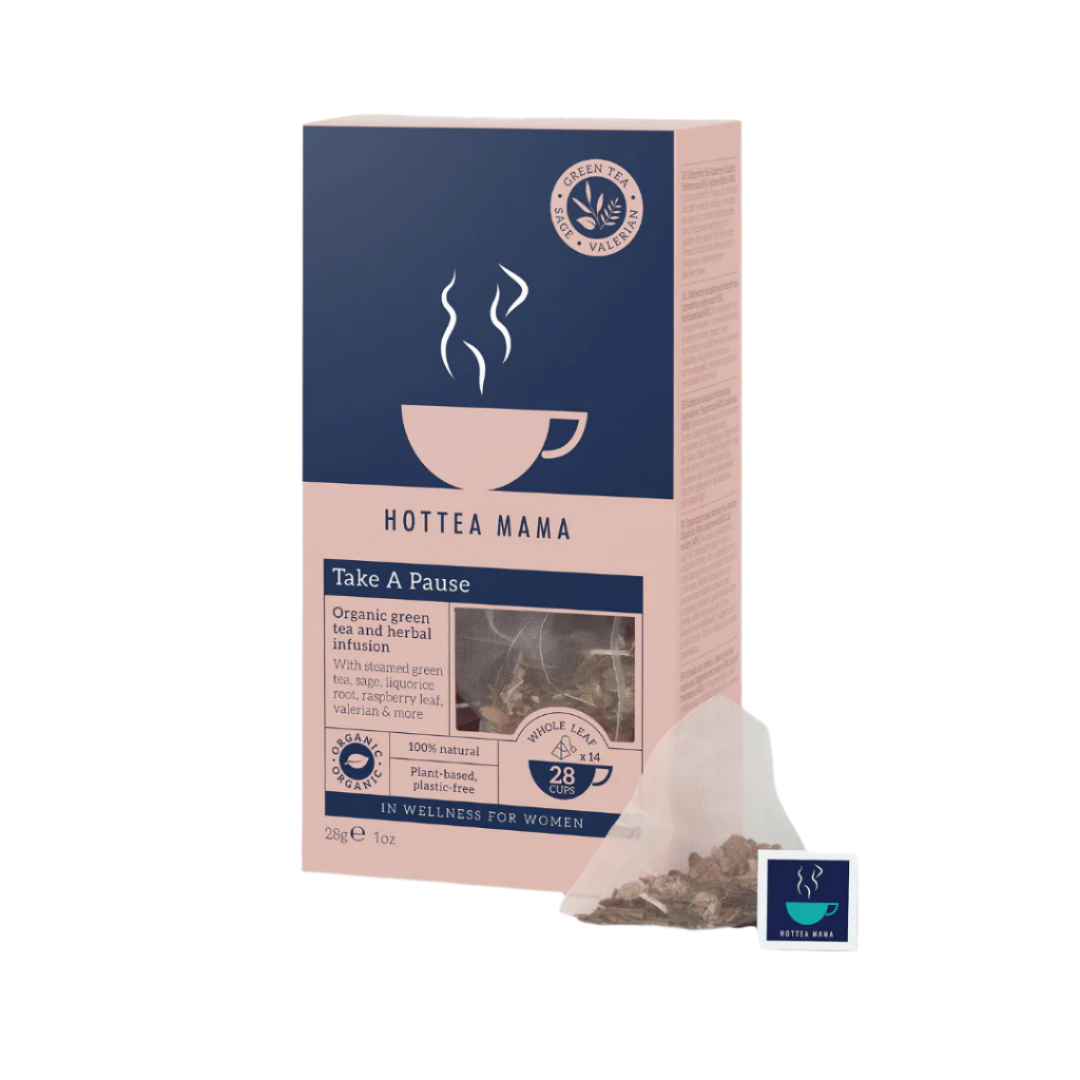The Journal
Irregular Periods During Perimenopause: Recognising Symptoms and Using Cycle Tracking for Support
Learn how irregular periods are a common symptom of perimenopause, what to expect from your cycle, and how tracking your symptoms can help manage this life transition.
Learn morePerimenopause: A New Beginning, Not an Ending
Perimenopause doesn’t have to be feared or dreaded. By reframing it as a period of reset rather than an ending, you can approach it with a sense of empowerment and optimism.
Learn moreThe Link Between the Japanese Diet and Reduced Menopause Symptoms
Incorporating elements of the Japanese diet into your meals can be a natural way to reduce menopause symptoms. Adding soy-based foods, fatty fish, and green tea can help support hormonal balance and overall wellness.
Learn moreUnderstanding Vaginal Dryness in Perimenopause and Menopause: Breaking the Silence
Many women feel embarrassed or hesitant to talk about vaginal dryness, even with their doctors. However, open discussions can reduce stigma and encourage more women to seek help. Vaginal dryness affects not just physical comfort, but emotional and sexual well-being as well. It’s a natural part of life for many women during perimenopause and menopause, yet it’s still often under-discussed, leading to unnecessary suffering.
Learn moreEmbracing Menopause Positively: Small Lifestyle Changes for Big Benefits
Menopause marks a new chapter, and while it comes with challenges, it’s also an opportunity for growth and self-care. By making small, consistent changes to your lifestyle, such as eating healthier, focusing on mental well-being, and staying active, you can embrace this transition with confidence and positivity.
Learn moreThe Importance of Sleep for Women's Health
September is National Sleep Month, so let's investigate the importance of sleep for our health. In the hustle and bustle of modern life, sleep often takes a backseat to other priorities.1 in 5 people in the UK aren't getting enough sleep, and women and other minorities are more likely to be affected. Yet, sleep is a cornerstone of health, particularly for women, who juggle multiple roles and responsibilities. Understanding the importance of sleep and how to prioritise it can lead to significant improvements in overall wellbeing, productivity, and quality of life. Why Sleep Matters for Women's Health Hormonal Balance Women experience various hormonal changes throughout their lives, including menstrual cycles, pregnancy, postpartum, and menopause. Quality sleep plays a critical role in regulating these hormones. Lack of sleep can disrupt the delicate hormonal balance, leading to issues such as irregular menstrual cycles, increased premenstrual symptoms, and complications during pregnancy and menopause. Mental Health Adequate sleep is essential for mental health. Women are more likely to experience anxiety and depression, conditions that can be exacerbated by sleep deprivation. Restful sleep helps regulate mood, improve cognitive function, and enhance emotional resilience. It is during sleep that the brain processes emotions and memories, which is crucial for maintaining mental health. Physical Health Sleep is vital for physical health. It allows the body to repair and regenerate. Chronic sleep deprivation is linked to a higher risk of various health issues, including cardiovascular disease, diabetes, and obesity. For women, who are at a higher risk of developing autoimmune diseases, sleep is particularly important in maintaining a robust immune system. Reproductive Health Quality sleep can positively impact reproductive health. It supports healthy fertility and pregnancy. During pregnancy, adequate sleep is crucial for the health of both the mother and the developing baby. Sleep disorders, such as sleep apnoea, are associated with adverse pregnancy outcomes, including pre-eclampsia and gestational diabetes. Aging and Longevity Sleep affects how women age. Poor sleep quality accelerates the aging process, contributing to the appearance of fine lines, wrinkles, and decreased skin elasticity. Moreover, consistent, quality sleep can enhance longevity, ensuring that women not only live longer but also enjoy a higher quality of life in their later years. Top 5 Tips for Prioritising Good Sleep Establish a Consistent Sleep Schedule Maintaining a regular sleep-wake cycle helps regulate your body's internal clock. Aim to go to bed and wake up at the same time every day, even on weekends. This consistency can improve the quality of your sleep. Create a Sleep-Conducive Environment Transform your bedroom into a sanctuary for sleep. Ensure that it is dark, quiet, and cool. Invest in a comfortable mattress and pillows. Remove electronic devices that can emit blue light and disrupt your sleep. Practice Relaxation Techniques Incorporate relaxation techniques into your bedtime routine to unwind and prepare your body for sleep. Activities such as reading, taking a warm bath, meditating, or practicing deep-breathing exercises can help you relax and fall asleep more easily. Be Mindful of Your Diet and Exercise What you eat and drink, as well as your level of physical activity, can significantly impact your sleep. Avoid caffeine and large meals close to bedtime. Engage in regular physical activity, but try to finish exercising at least a few hours before bed to avoid being too energized to sleep. Limit Screen Time Before Bed Exposure to screens before bedtime can interfere with your ability to fall asleep. The blue light emitted by phones, tablets, and computers can suppress melatonin production, a hormone that regulates sleep. Aim to turn off electronic devices at least an hour before bedtime and engage in calming activities instead. Conclusion Sleep is not a luxury; it is a necessity, particularly for women's health. Prioritising sleep can lead to profound benefits, from hormonal balance and mental health to physical wellbeing and longevity. By following these tips and making sleep a priority, women can improve their overall health and enjoy a more vibrant, balanced life. So tonight, turn off your screens, unwind with a good book, and embrace the restorative power of sleep. References: https://mentalhealth-uk.org/help-and-information/sleep/
Learn moreBoost Your Wellbeing: 5 Simple Steps to a Happier Life
Maintaining good mental health is crucial for overall well-being, and the NHS provides a comprehensive guide to enhancing your mental health through five key steps: Connect with Others: Engaging with friends, family, and colleagues helps build a support network. Whether it's sharing meals, joining clubs, or simply catching up over a call, these connections provide emotional support and a sense of belonging. Be Physically Active: Physical activity is not just about improving fitness; it also boosts mood and reduces anxiety. Activities like walking, cycling, or even gardening can be effective. The key is to find something you enjoy that fits into your daily routine. Learn New Skills: Acquiring new skills can boost your self-confidence and provide a sense of achievement. Whether it's learning to cook, taking up a new hobby, or pursuing an online course, the process of learning can be as rewarding as the skills themselves. Give to Others: Acts of kindness and giving can create positive feelings and help build a sense of community. This could be through volunteering, helping a neighbour, or simply giving a compliment. These actions not only benefit others but also enhance your own mental wellbeing. Be Mindful: Mindfulness involves paying full attention to the present moment, including your thoughts, feelings, and the world around you. Practices like meditation, yoga, or even mindful walking can help you develop this awareness, reducing stress and improving your emotional health. For those seeking more support, consider exploring online resources, local community centres or networks, or speaking with a mental health professional. The NHS website offers further guidance and links to supportive services, providing a good starting point for anyone looking to improve their mental wellbeing. Tips and tricks: When starting anything new, start small. Our blog on habit stacking gives the lowdown on how to create consistency with new habits, check it out here. Enlist a friend or family member: going it alone is hard! Finding someone to keep you on track can help, and make it more fun in the process. Celebrate the small wins! Create some really small goals to focus on. You wouldn’t expect to run a 10k straight away, so neither should you expect to change your lifestyle overnight. Journaling is a great tool for mindfulness but can be a tricky skill to master, so a guided journal can help you to get started. If you've got time, volunteering is a great way to make friends and build community, and it makes you feel good. Council websites will often have a volunteering portal which you can sign up to. Check out Stoke-on-Trent Council's version here. For more detailed advice and support options, visit the NHS's mental wellbeing guide.
Learn moreThe Digital Detox Movement: Reclaiming Your Life from Social Media
The digital detox movement advocates for taking intentional breaks from digital devices, particularly from social media platforms. This movement is not about shunning technology entirely but about finding a balance and fostering healthier relationships with our digital lives.
Learn moreCelebrating Women's History Month
As March unfolds, so does a vibrant celebration of resilience, courage, and achievement — Women's History Month. It's a time to reflect on the extraordinary contributions of women throughout history and their ongoing journey towards equality and empowerment. This annual observance provides a poignant opportunity to delve into the rich tapestry of women's experiences, from the unsung heroines who shaped communities to the iconic figures who defied norms and shattered glass ceilings. Across the globe, women have left an indelible mark in every sphere of human endeavour. From science, literature, and politics to art, business, and social activism, their influence knows no bounds. Yet, too often, their stories have been relegated to the footnotes of history. Women's History Month serves as a powerful corrective, amplifying their voices and illuminating their legacies. We celebrate visionaries like Marie Curie, whose ground-breaking research in radioactivity earned her two Nobel Prizes, or Rosa Parks, whose act of defiance catalysed the civil rights movement. We honour the resilience of Malala Yousafzai, who continues to advocate for girls' education despite facing adversity, and the tenacity of Amelia Earhart, whose pioneering flights inspired generations of aviators. But Women's History Month is not only about commemorating the past; it's also about galvanising action in the present. It's a call to address persistent inequities and dismantle barriers that hinder women's progress. It's about fostering an inclusive society where every woman and girl can thrive, irrespective of their background or circumstances. In today's world, we see women leading businesses, commanding armies, and spearheading social movements. Yet, we also recognise the unfinished work ahead. Gender disparities persist in areas such as pay equity, representation in leadership roles, and access to healthcare and education. Women continue to face discrimination, violence, and systemic injustices. As we honour the achievements of women past and present, let us recommit ourselves to the pursuit of gender equality. Let us amplify women's voices, challenge stereotypes, and create pathways for advancement. Let us support initiatives that promote women's empowerment and ensure that every girl grows up in a world where her dreams are limitless. This Women's History Month, let's celebrate the courage, resilience, and achievements of women around the world. Let's honour their contributions, learn from their stories, and work together to build a future where gender equality is not just a dream but a reality. After all, when women succeed, societies prosper, and humanity thrives.
Learn more
In The Press

Simplify Your Fertility Tracking with Tempdrop
Take the guesswork out of cycle tracking with Tempdrop, the smart wearable thermometer that fits seamlessly into your routine. Designed to learn your unique patterns, it provides accurate, reliable insights without the hassle of early wake-ups or daily charts.


















